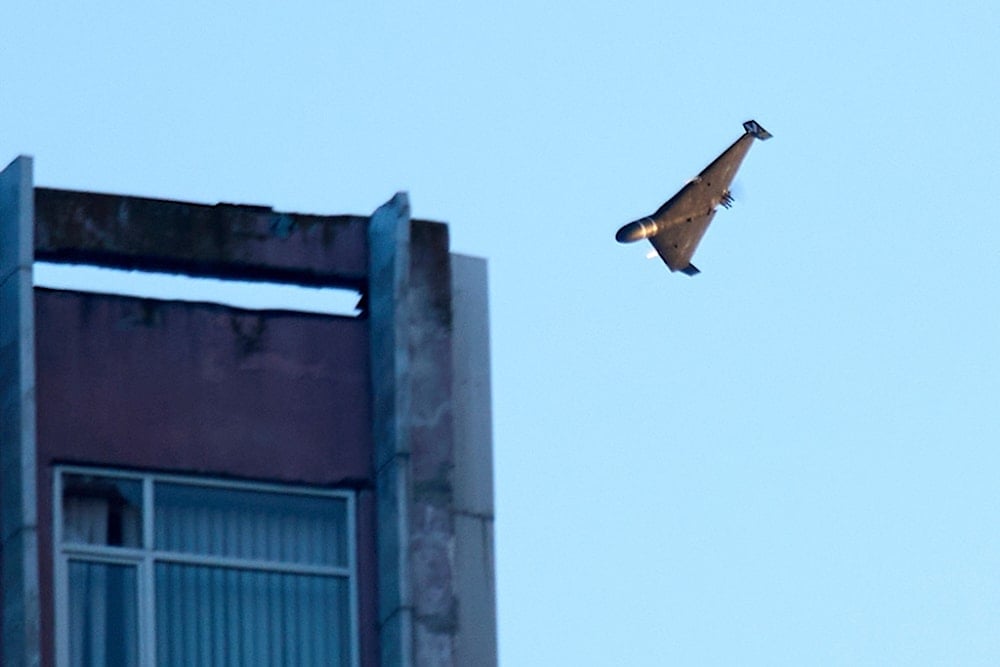Russia urges West to drop hostility, warns against NATO threat
Russia says it is not the West’s enemy but demands NATO stop eastward expansion as drone warfare and deadly strikes escalate in Kiev and southern regions.
-

A Russian drone attacks a building during Russia's missile and drone air attack in Kiev, Ukraine, Tuesday, June 17, 2025. (AP)
Russia does not view itself as an enemy of the West and remains open to dialogue, provided the West abandons its confrontational stance toward Moscow, Deputy Foreign Minister Alexander Grushko said on Monday.
In remarks to Russia’s RIA Novosti, Grushko emphasized that Moscow’s foreign policy concept is not guided by hostility. “We do not consider ourselves enemies of the West. We are ready for dialogue, but only if our opponents abandon their confrontational policy against Russia and halt eastward expansion,” he said. Grushko also underscored that any dialogue must be based on “sovereign equality and mutual respect for national interests.”
His comments come in response to NATO Secretary-General Mark Rutte’s recent suggestion that relations with Russia should eventually return to normal after the end of the Ukraine war. Grushko was skeptical of the prospect, saying Rutte’s vision represents “a very long-term perspective that is nowhere on the horizon yet.”
Earlier, in an interview for Bloomberg, Rutte stated that it is natural for Europe and the US to seek a gradual normalization of relations with Russia after the conflict concludes. “The war will have to fade eventually, and with it, so too must our estrangement,” he remarked.
NATO expansion straining security
Senior Russian diplomat Sergey Ryabkov has said earlier in June that NATO expansion is the root cause of the current breakdown in Euro-Atlantic security, warning that the West ignored clear warnings from Moscow and dismantled the foundations of post-Cold War stability.
In a wide-ranging interview, Ryabkov asserted that NATO's encroachment on Russia’s borders has contributed directly to the ongoing conflict and strained US-Russia relations.
The issue of NATO expansion and Russia's red lines has become a central theme in Moscow's diplomatic posture, particularly following the alliance’s continued attempts to expand to Ukraine and Georgia, as well as Sweden and Finland’s recent integration. “The current state of affairs in the Euro-Atlantic area is a direct consequence of the West’s unilateral actions and failure to respect our concerns,” Ryabkov said.
He argued that NATO's military infrastructure moving closer to Russian borders forced Moscow to take defensive measures. The Russian official stated that the alliance’s activities in Eastern Europe, including rotational deployments and joint exercises, have fed into a security dilemma that could have been avoided.
Russia downs 23 Ukrainian drones overnight
Also on Monday, Russia’s Ministry of Defense announced that its air defense systems intercepted and destroyed 23 Ukrainian drones overnight in various regions.
According to the Ministry, 14 drones were downed over Rostov Oblast, five over Volgograd, and four over Astrakhan. The attempted strikes are part of ongoing Ukrainian efforts to target Russian infrastructure deep within the country.
The drone attacks come amid heightened hostilities along multiple fronts, with Moscow saying it had adopted the necessary measures to repel any potential threats from NATO.
Meanwhile, Ukrainian officials reported that Russian missile and drone attacks on Kiev and surrounding areas overnight resulted in at least five fatalities and 21 injuries.
Ukrainian Interior Minister Ihor Klymenko stated that in the Shevchenkivskyi district of western Kiev, “an entire section of a multi-story residential building was destroyed,” confirming four deaths and 10 injuries in the area. Another person was killed and 10 wounded in strikes on Bila Tserkva, a city south of the capital.

 4 Min Read
4 Min Read











